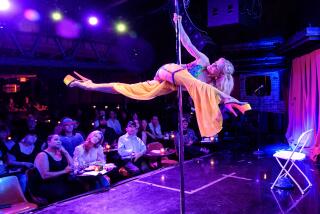DANCE REVIEW : Rose Polsky and Her Company Perform at Loyola Marymount
- Share via
Nominally, Rose Polsky is a phenomenon of the ‘80s--now that it’s fashionable to flag one’s ethnic background.
Yet when the Sarah Lawrence graduate and her dancers performed at Loyola Marymount University on Thursday night one had to admire the judgment and integrity of Rose Polsky. As a choreographer she does belong to a quasi-archeological genre that communes with the past. What’s in a name? History.
Her dances are wordless scripts evoking primordial memories. And that account calls to mind Meredith Monk, of course, whose music Polsky used so aptly in her opening solo, “Black Dress.”
She moves with a rapt purity, a sure knowledge of balletic expression, and can sustain tension for the sudden rat-a-tat of flat-foot staccato steps and whirling extravaganzas that come to her as revelations in the life of an ancient peasant woman.
In fact all the pieces she danced hinted of epiphany. But her trance-like state bore no similarity to other tranciacs like Laura Dean. Rather, Polsky is impelled by a particular scenario--one with abrupt and discrete messages that seemingly occur in the moment.
Not everything stays at this high level, though, since her best choreography is what she devises for herself. All the music, threaded together on a historical continuum, is vocal or choral. But the solo for Elizabeth Chandler misappropriates two of Canteloube’s gorgeously ethereal “Auvergne” songs for fits of lunging and contracting and skin screeching against linoleum, while Jill Jacobson-Bennett fails to make any impact in hers, moving about with face and head under gauzy wraps.
“Ground and Air,” despite its mundane moments, emerged with Polsky’s stamp of ecstasy. A study in satin Baroque for herself, Chandler and Sigmund Hightower, it also boasted good contrapuntal design.--DONNA PERLMUTTER
More to Read
The biggest entertainment stories
Get our big stories about Hollywood, film, television, music, arts, culture and more right in your inbox as soon as they publish.
You may occasionally receive promotional content from the Los Angeles Times.










